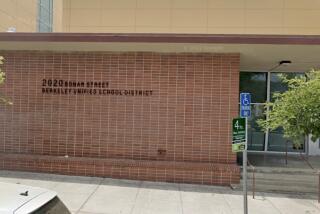Don’t Blame Teachers
My sister works in a profession that has a greater impact on our collective futures than just about any other job I can think of. Oddly, her salary in no way reflects the importance of her work. She persevered through six years of higher education to be qualified to work in her field and yet she does not technically have a master’s degree. She is required to attend continuing education classes but is not reimbursed for the cost of these classes or the time she devotes to them. She routinely uses her own money to provide materials for those she serves, yet is rarely acknowledged for her generosity. No matter how hard she works, her success is wholly dependent on the actions of others, but she receives the majority of the blame when her efforts are not fruitful.
What is my sister’s occupation? She is a public schoolteacher in an inner-city area of California.
Having attended public schools only in middle-class neighborhoods, I had no idea what educators face in inner-city schools until my sister decided to “serve where the need is greatest” and accepted a job in an elementary school in a lower-income neighborhood. Over the past six years she has worked in several schools in the South Sacramento area, all of which are plagued by the same types of problems. Sections of the playgrounds are routinely cordoned off because of gunfire in the area. Vandalism of school property is so common school officials no longer file police reports. Local teenagers jump schoolyard fences and steal balls and other playground equipment while school is in session. Students who are smart are teased and feel compelled to hide the fact that they actually study and complete their course work. Parents allow their children to miss school simply because their kids didn’t feel like sitting in class. Children and parents pilfer supplies from classrooms. Parents berate, instead of support, teachers who inform them of their children’s misdeeds while in school.
The detrimental effects of these acts of violence and disrespect are felt far beyond the immediate disruption they produce in the classroom. Vandalism and theft of school property not only reduce the quality and quantity of the educational materials available to students, they also breed in children a sense of disrespect for schools, teachers and education that hampers their desire to learn.
The lack of support teachers receive from parents coupled with the teasing that children experience at the hands of their peers send the message that learning and education are not important. In some neighborhoods, the desire to learn is so discouraged it has to fight to remain alive. Sadly, hard-working teachers often are blamed for circumstances beyond their control. No matter how capable and dedicated a teacher is, it is very hard to teach students who live in a world surrounded by violence and the message that school is not important. Instead of vilifying teachers for low test scores and discarding public schools for private institutions, we should support our school system and place the responsibility for making education a priority in the hands of parents. Until society recognizes and accepts the vital role parents play in the education of our children we will never solve California’s education crisis, and teachers will continue to be wrongly blamed for deeply entrenched problems they cannot correct.
Diana Morrison lives in Long Beach.
More to Read
Sign up for Essential California
The most important California stories and recommendations in your inbox every morning.
You may occasionally receive promotional content from the Los Angeles Times.










